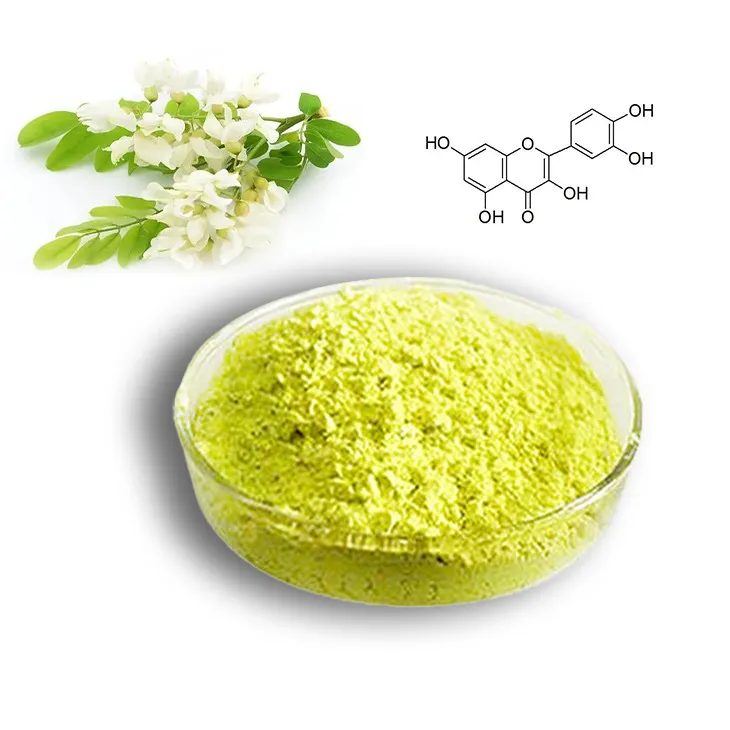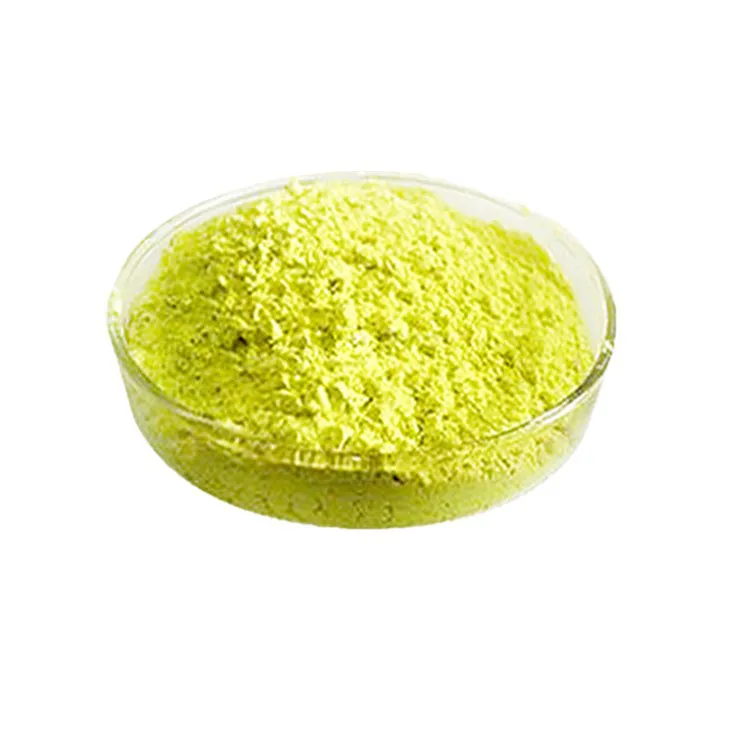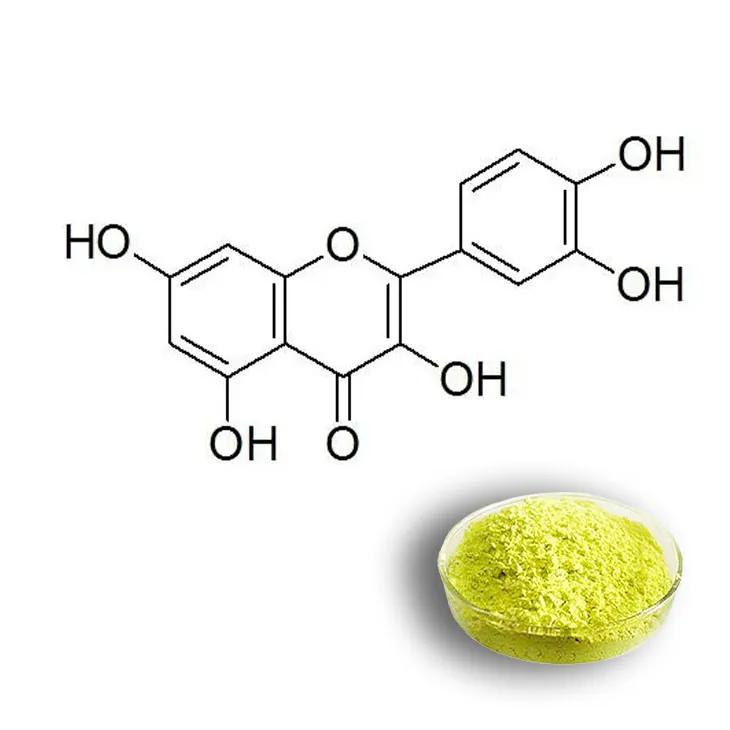- 0086-571-85302990
- sales@greenskybio.com
The Magic of Quercetin Powder: A Comprehensive Guide
2024-11-12

Introduction
Quercetin powder has been gaining significant attention in the world of health and nutrition. This flavonoid, which is found naturally in many fruits, vegetables, and grains, has shown a plethora of health - promoting properties. In this comprehensive guide, we will explore the various aspects of Quercetin powder, from its antioxidant capabilities to its potential in enhancing heart health and reducing inflammation.

What is Quercetin?
Quercetin is a type of flavonoid, a class of plant - based compounds known for their antioxidant and anti - inflammatory properties. It is found in a wide range of foods such as apples, onions, berries, and green tea. Quercetin powder is a concentrated form of this compound, which makes it easier to consume in larger quantities for those seeking its health benefits.

The Antioxidant Power of Quercetin Powder
1. Understanding Free Radicals
Free radicals are highly reactive molecules that are produced in our bodies as a result of normal metabolic processes, as well as exposure to environmental factors like pollution, UV radiation, and cigarette smoke. These free radicals can cause damage to our cells, DNA, and proteins, which is linked to various diseases and the aging process.
2. How Quercetin Combats Free Radicals
Quercetin powder acts as a powerful antioxidant. Antioxidants are substances that can neutralize free radicals by donating an electron to them without becoming unstable themselves. Quercetin has a unique chemical structure that allows it to scavenge a variety of free radicals in the body. This helps to protect our cells from oxidative damage, reducing the risk of chronic diseases such as cancer, heart disease, and neurodegenerative disorders.
3. Studies Supporting Quercetin's Antioxidant Activity
Several scientific studies have demonstrated the antioxidant properties of quercetin. For example, in vitro studies have shown that quercetin can effectively inhibit the formation of free radicals and protect cell membranes from oxidative stress. In vivo studies in animals have also indicated that quercetin supplementation can reduce oxidative damage in various tissues, including the liver, heart, and brain.

Quercetin Powder and Inflammation
1. The Role of Inflammation in Health
Inflammation is a natural response of the body's immune system to injury or infection. However, chronic inflammation can be a problem. It is associated with many diseases, including arthritis, diabetes, and cardiovascular diseases. Chronic inflammation occurs when the body's immune system is constantly activated, leading to the release of inflammatory mediators that can damage healthy tissues.
2. Quercetin's Anti - Inflammatory Mechanisms
Quercetin powder has been shown to have anti - inflammatory properties. It can inhibit the activity of enzymes and proteins involved in the inflammatory response. For example, it can suppress the activation of nuclear factor - kappa B (NF - κB), a key regulator of inflammation. By inhibiting NF - κB, quercetin can reduce the production of inflammatory cytokines such as interleukin - 1β (IL - 1β) and tumor necrosis factor - α (TNF - α).
3. Evidence from Research on Quercetin's Anti - Inflammatory Effects
Research has provided evidence of quercetin's anti - inflammatory effects. In human clinical trials, quercetin supplementation has been shown to reduce markers of inflammation in patients with certain inflammatory diseases. For example, in patients with rheumatoid arthritis, quercetin supplementation was associated with a decrease in pain and swelling, as well as a reduction in levels of inflammatory markers in the blood.

Quercetin Powder and Heart Health
1. Heart Disease Risk Factors
There are several risk factors for heart disease, including high blood pressure, high cholesterol levels, and obesity. These risk factors can lead to the development of atherosclerosis, a condition in which plaque builds up in the arteries, restricting blood flow to the heart.
2. How Quercetin May Support Heart Health
Quercetin powder may play a role in supporting heart health in several ways. First, its antioxidant properties can protect the heart from oxidative damage. Second, its anti - inflammatory properties can help to reduce inflammation in the blood vessels, which is associated with atherosclerosis. Third, quercetin may also have an effect on blood lipid levels. Some studies have suggested that quercetin can lower LDL ( "bad" ) cholesterol levels and increase HDL ( "good" ) cholesterol levels.
3. Clinical Studies on Quercetin and Heart Health
Clinical studies have investigated the relationship between quercetin and heart health. For example, some studies have found that quercetin supplementation can improve endothelial function, which is important for maintaining healthy blood vessels. Other studies have shown that quercetin can reduce blood pressure in patients with hypertension.
How to Incorporate Quercetin Powder into Your Diet
1. Food Sources of Quercetin
As mentioned earlier, quercetin is found in many foods. Some of the richest sources include apples, especially the skin, onions, cranberries, blueberries, and broccoli. Consuming a diet rich in these foods can provide a natural source of quercetin. However, if you want to increase your intake significantly, quercetin powder can be a convenient option.
2. Dosage and Safety
The appropriate dosage of quercetin powder can vary depending on individual needs and health conditions. In general, the recommended daily dose for adults ranges from 500 - 1000 mg. However, it is important to note that high doses of quercetin may cause some side effects, such as stomach upset or headaches. It is always advisable to consult a healthcare provider before starting any new supplement.
3. Tips for Using Quercetin Powder
Quercetin powder can be added to smoothies, juices, or yogurt. It can also be used in baking or cooking, although heat may affect its antioxidant properties to some extent. Another option is to take it in capsule form, which is convenient for those who prefer a more straightforward supplementation method.
Conclusion
Quercetin powder is a fascinating substance with a wide range of potential health benefits. Its antioxidant and anti - inflammatory properties make it a valuable addition to a healthy lifestyle. Whether it is for protecting against oxidative damage, reducing inflammation, or supporting heart health, quercetin powder has shown great promise. However, more research is still needed to fully understand all of its mechanisms of action and to determine the optimal dosage for different health conditions. As with any supplement, it is important to use quercetin powder responsibly and under the guidance of a healthcare professional.
FAQ:
What are the antioxidant properties of quercetin powder?
Quercetin powder is rich in antioxidants. It has the ability to neutralize free radicals in the body. Free radicals are unstable molecules that can cause damage to cells, DNA, and proteins. By donating electrons, quercetin stabilizes these free radicals, preventing oxidative stress and reducing the risk of various diseases associated with oxidative damage, such as cancer, neurodegenerative diseases, and aging - related problems.
How does quercetin powder reduce inflammation?
Quercetin powder can modulate the body's inflammatory response. It inhibits the production of certain inflammatory mediators like cytokines and prostaglandins. These mediators are often over - produced during inflammation, leading to pain, swelling, and tissue damage. By reducing their production, quercetin helps to keep the inflammatory process in check, potentially alleviating symptoms of inflammatory conditions such as arthritis, asthma, and inflammatory bowel diseases.
What role does quercetin powder play in supporting heart health?
Quercetin powder has several beneficial effects on heart health. It can help lower blood pressure by relaxing blood vessels, improving blood flow. It also has antioxidant properties that protect the heart from oxidative stress, which can damage the heart cells. Additionally, quercetin may reduce cholesterol levels, particularly LDL ( bad" cholesterol), thereby decreasing the risk of atherosclerosis and heart disease.
How can one take quercetin powder?
Quercetin powder can be taken in various ways. It is often available as a dietary supplement in powder form. It can be mixed with water, juice, or smoothies and consumed orally. However, it is important to follow the recommended dosage instructions provided by the manufacturer or a healthcare professional. Some people may also get quercetin from natural food sources rich in it, such as onions, apples, berries, and green tea, but the concentration in these foods may be lower compared to the supplement.
Are there any side effects of taking quercetin powder?
While quercetin powder is generally considered safe for most people when taken in appropriate doses, some individuals may experience side effects. These can include mild gastrointestinal issues such as stomach upset, nausea, or diarrhea. In rare cases, it may also cause allergic reactions in people who are sensitive to it. It is advisable to consult a doctor before starting to take quercetin powder, especially if you have pre - existing medical conditions or are taking other medications.
Related literature
- "The Antioxidant and Anti - Inflammatory Properties of Quercetin: A Review"
- "Quercetin and Heart Health: Mechanisms and Therapeutic Potential"
- "Quercetin: A Multifaceted Bioflavonoid with Diverse Health - promoting Properties"
- ▶ Hesperidin
- ▶ citrus bioflavonoids
- ▶ plant extract
- ▶ lycopene
- ▶ Diosmin
- ▶ Grape seed extract
- ▶ Sea buckthorn Juice Powder
- ▶ Beetroot powder
- ▶ Hops Extract
- ▶ Artichoke Extract
- ▶ Reishi mushroom extract
- ▶ Astaxanthin
- ▶ Green Tea Extract
- ▶ Curcumin Extract
- ▶ Horse Chestnut Extract
- ▶ Other Problems
- ▶ Boswellia Serrata Extract
- ▶ Resveratrol Extract
- ▶ Marigold Extract
- ▶ Grape Leaf Extract
- ▶ blog3
- ▶ blog4
- ▶ blog5
-
Organic Tongkat Ali extract powder factory.
2024-11-12
-
How to make powder with ashwagandha extract.
2024-11-12
-
Rosehip extract manufacturers from China.
2024-11-12
-
The best cat's claw extract in nature.
2024-11-12
-
Chinese Dandelion Leaf Extract Suppliers.
2024-11-12
-
Saffron Extract Powder
2024-11-12
-
Citrus bioflavonoids
2024-11-12
-
Calendula Extract
2024-11-12
-
Agaricus Blazei Extract
2024-11-12
-
Rosemary extract
2024-11-12
-
Almond Extract Powder
2024-11-12
-
Kidney Bean Extract
2024-11-12
-
Berberis aristata Extract
2024-11-12
-
Polygonum Cuspidatum Extract
2024-11-12
-
Mango flavored powder
2024-11-12





















